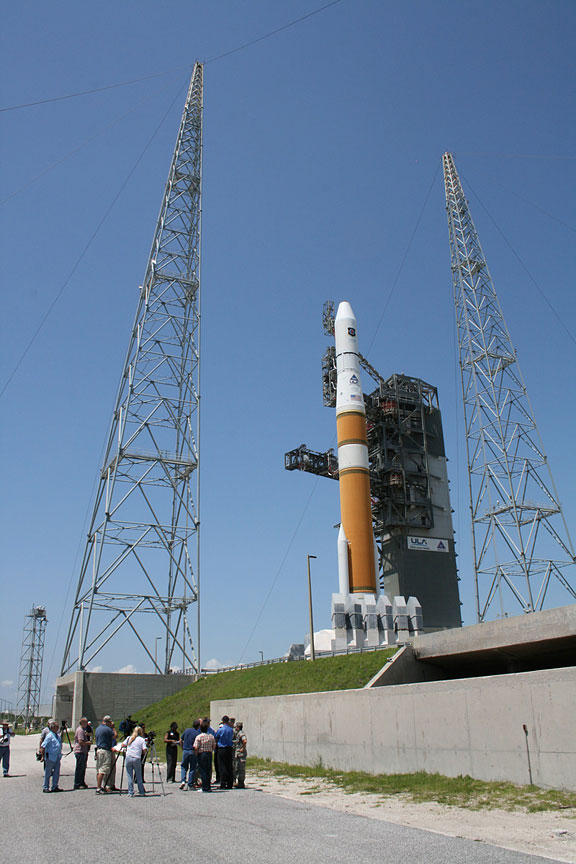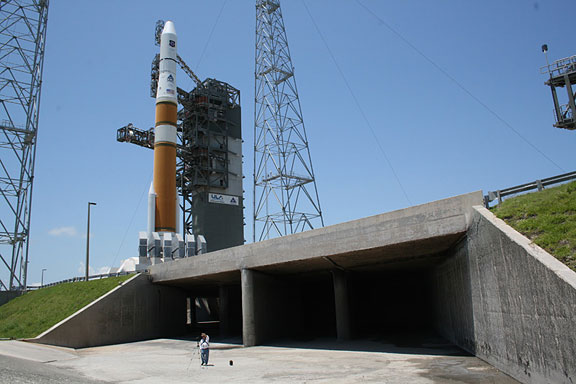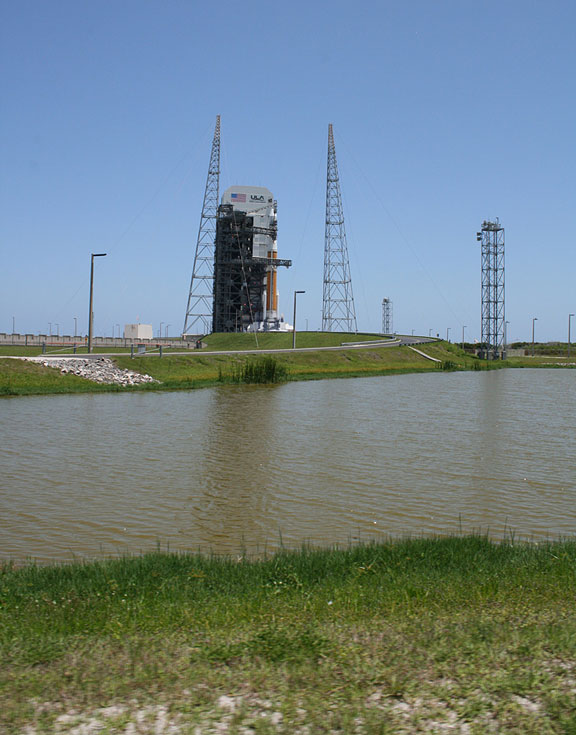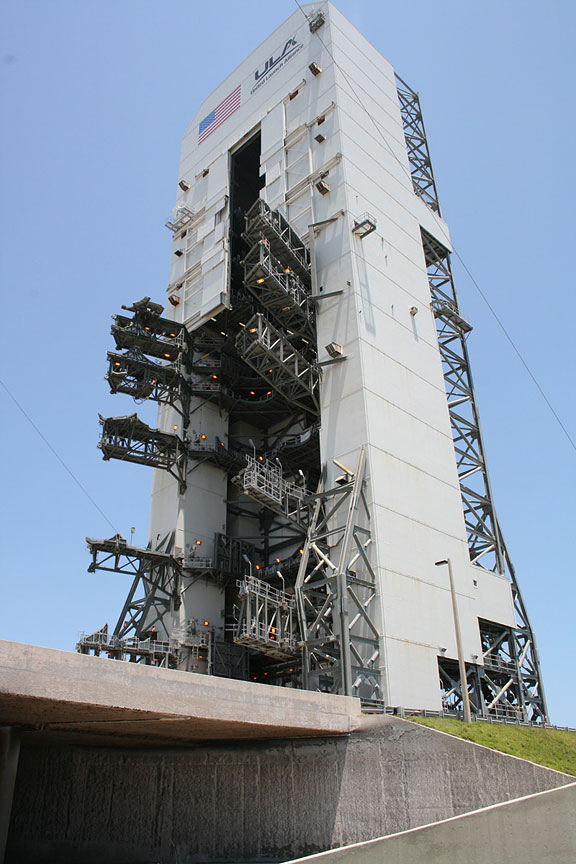New Delhi, India (PTI) Aug 13, 2010
India Tuesday launched a satellite-based navigation system to aid air traffic in the region and joined a select club of nations which have similar capabilities. Civil Aviation Minister Praful Patel launched the Global Position System Aided Geo Augmented Navigation (gagan) based on a constellation of 24 satellites positioned in six earth-centred orbital planes. gagan will provide seamless coverage of air traffic from south Asia to Africa and connect to the systems of Europe and Japan. It is a also expected to enhance marine and transport navigation, search and rescue operations, survey and mapping.
"This system is expected to provide enhanced navigation performance for critical applications like civil aviation, marine navigation, train and road transport," said a ministry official.
At present, only the United States, European Union and Japan have such a system.
Airport officials said the system will enable airlines to chart out direct routes as they will be less dependent on the ground-based radar systems, save fuel and increase efficiency.
gagan is a joint initiative of the Airports Authority of India (AAI) and Indian Space Research Organisation (ISRO).
The system provides enhanced safety features for the airlines as they would be able to have precision approach guidance towards runways in any weather conditions, the officials said. It will also increase air-to-air surveillance.
Source: Press Trust of India
Showing posts with label GPS. Show all posts
Showing posts with label GPS. Show all posts
Delta 4 Poised to Launch with Next Generation GPS Satellite
Ken Kremer for NASA WATCH 21 May 2010, Kennedy Space Center
The launch of a Delta 4 rocket carrying the first in a new series of next generation GPS satellites has been rescheduled for Sunday night (May 23) at 11:17 PM EDT from Cape Canaveral, Florida after the countdown was halted barely 4 minutes prior to liftoff, shortly before midnight on Friday (May 21).
The last minute countdown scrub was called after loss of "the telemetry signal between the GPS and the satellite ground support equipment," according to a statement issued by the Air Force and United Launch Alliance (ULA).
Sunday's launch window runs from 11:17 to 11:35 PM EDT. The weather forecast predicts a 70 percent chance of favorable conditions.
May 2010 marks the 50th anniversary of the Delta program. The first Thor-Delta launched on 13 May 1960.
"This will be the 349th Delta launch. Overall, the Delta family of expendable rockets has a 95.7% success rate. Delta 4 was a 100% success rate since starting 8 years ago," said Bill Cullin, the Delta Launch Director for ULA at Pad 37.
The GPS IIF-1 satellite is the first in an advanced series of 12 satellites funded by the US Air Force which will provide highly accurate, three dimensional position, navigation and timing information on a 24/7 basis in all weather conditions. The spacecraft serve both military and civilian purposes.
The 330 ft tall mobile launch gantry was retracted from around the rocket early Friday morning. Media including myself visited Launch Complex 37 shortly thereafter at noon for a photo op.
See my photo gallery below of the Delta 4 rocket poised at Pad 37.
Watch for my post launch report.

Delta 4 rocket poised to launch on May 23 at 11:17 PM EDT from Space Launch Complex 37 at Cape Canaveral Air Force Station, Florida. Credit: Ken Kremer

Close up of Delta rocket with 4 meter composite payload fairing surrounding GPS IIF-1 navigation satellite. Credit: Ken Kremer

Media visit on May 21 to Delta 4 rocket astride fixed umbilical tower, lightening towers and flame trench. Credit: Ken Kremer

The Delta 4 rocket sits atop flame trench. Nearly a million pounds of thrust will be exhausted through the ducts at liftoff towards photographers location. Credit: Ken Kremer

Launch Complex 37 with Delta 4 rocket at Cape Canaveral Air Force Station, Florida. Credit: Ken Kremer

Mobile Service Tower at Complex 37 with swing arms open was retracted from Delta 4 rocket on the morning of May 21, 2010. Gantry sits atop flame trench. Credit: Ken Kremer

Ken Kremer on top of Launch Complex 37 with mighty 212 ft tall Delta 4 rocket which will fly in the Medium+ (4,2) configuration with two 65 ft long solid rocket motors. Credit: Ken Kremer
credit:www.spaceref.com
The launch of a Delta 4 rocket carrying the first in a new series of next generation GPS satellites has been rescheduled for Sunday night (May 23) at 11:17 PM EDT from Cape Canaveral, Florida after the countdown was halted barely 4 minutes prior to liftoff, shortly before midnight on Friday (May 21).
The last minute countdown scrub was called after loss of "the telemetry signal between the GPS and the satellite ground support equipment," according to a statement issued by the Air Force and United Launch Alliance (ULA).
Sunday's launch window runs from 11:17 to 11:35 PM EDT. The weather forecast predicts a 70 percent chance of favorable conditions.
May 2010 marks the 50th anniversary of the Delta program. The first Thor-Delta launched on 13 May 1960.
"This will be the 349th Delta launch. Overall, the Delta family of expendable rockets has a 95.7% success rate. Delta 4 was a 100% success rate since starting 8 years ago," said Bill Cullin, the Delta Launch Director for ULA at Pad 37.
The GPS IIF-1 satellite is the first in an advanced series of 12 satellites funded by the US Air Force which will provide highly accurate, three dimensional position, navigation and timing information on a 24/7 basis in all weather conditions. The spacecraft serve both military and civilian purposes.
The 330 ft tall mobile launch gantry was retracted from around the rocket early Friday morning. Media including myself visited Launch Complex 37 shortly thereafter at noon for a photo op.
See my photo gallery below of the Delta 4 rocket poised at Pad 37.
Watch for my post launch report.

Delta 4 rocket poised to launch on May 23 at 11:17 PM EDT from Space Launch Complex 37 at Cape Canaveral Air Force Station, Florida. Credit: Ken Kremer

Close up of Delta rocket with 4 meter composite payload fairing surrounding GPS IIF-1 navigation satellite. Credit: Ken Kremer

Media visit on May 21 to Delta 4 rocket astride fixed umbilical tower, lightening towers and flame trench. Credit: Ken Kremer

The Delta 4 rocket sits atop flame trench. Nearly a million pounds of thrust will be exhausted through the ducts at liftoff towards photographers location. Credit: Ken Kremer

Launch Complex 37 with Delta 4 rocket at Cape Canaveral Air Force Station, Florida. Credit: Ken Kremer

Mobile Service Tower at Complex 37 with swing arms open was retracted from Delta 4 rocket on the morning of May 21, 2010. Gantry sits atop flame trench. Credit: Ken Kremer

Ken Kremer on top of Launch Complex 37 with mighty 212 ft tall Delta 4 rocket which will fly in the Medium+ (4,2) configuration with two 65 ft long solid rocket motors. Credit: Ken Kremer
credit:www.spaceref.com
label:
Delta,
GPS,
GPS News Hits,
Satellite
Google confesses it collected Wi-Fi data
SAN FRANCISCO — Google said Friday that for more than three years it has inadvertently collected snippets of private information that people send over unencrypted wireless networks.
The admission, made in an official blog post by Alan Eustace, Google's engineering chief, comes a month after regulators in Europe started asking the search giant questions about Street View, the layer of real-world photographs accessible from Google Maps.
Regulators wanted to know what data Google collects as its camera-laden cars methodically troll through neighborhoods, and what Google does with that data.
Google appears to have acted quickly after the questions were raised. Two weeks ago, Google said it did collect certain kinds of data around the world that identify Wi-Fi networks to help improve its mapping products.
The data on wireless networks can be used for advertising services for mobile phones, which can be pinpointed via a wireless network even if they lack a GPS chip. But the company said it did not collect or store “payload data” — the information being transmitted by users over unprotected networks.
In a confession made Friday that is sure to raise questions about its privacy policies, Google said that its claims were wrong.
Eustace wrote that a review of the Street View software has revealed that due to a programming error in 2006, the company has been mistakenly collecting snippets of data that happened to be transmitted over non-password protected Wi-Fi networks that the
Google camera cars were passing. This occurred in Europe, in the United States and in other major cities elsewhere.
Eustace tried to play down the revelation, saying that Google “never used that data in any Google products.”
Google said it has temporarily halted its Street View cars and will stop collecting Wi-Fi data. Eustace said Google wants to delete the data, in cooperation with regulators, as soon as possible.
But the revelation is likely to set off a firestorm of protest and possibly new legal problems. Google could be accused of intercepting private communications and violating wiretap laws in the United States .
Credit: By BRAD STONE New York Times
label:
Alan Eustace,
Google Camera Car,
Google Maps,
Google Product,
GPS,
GPS Chip,
Street View,
Wi-Fi
$150K bond for man tracked by GPS in stolen taxi
Travis E. Conner III, 18, of the 2900 block of West Fulton Street is charged with one count of robbery and aggravated vehicular hijacking, according to police News Affairs.
Conner was ordered held on $150,000 Monday and a preliminary hearing was set for May 3 in Northwest Felony Court (Br. 50), Cook County State's Attorney's office spokeswoman Tandra Simonton said.
Conner allegedly forced a cab driver out of his taxi at gunpoint about 3:30 a.m. Sunday, the release said. He dropped his cell phone at the scene before fleeing in the cab, which is equipped with a GPS.
Using the GPS, police found the cab at a gas station in the 6300 block of North Central Avenue, the release said. Conner was identified and a semi-automatic handgun was recovered.
credit: www.suntimes.com
label:
GPS,
GPS News Hits,
Taxi
BlackBerry Bold 9650 Coming to Sprint
RIM and Sprint on Monday announced the BlackBerry Bold 9650, a follow-up to the popular BlackBerry Tour, which adds Wi-Fi and ditches the troublesome trackball for an optical trackpad.
The Tour's trackball has been users' number-one complaint about the smartphone, because the little ball tends to get gunky or sticky. The Bold 9650 looks almost exactly like the Tour, except RIM has swapped out the ball for a smooth, gunk-free pad. Like the Tour, it has a 2.44-inch, 480-by-360 screen.
The Bold 9650 also includes Wi-Fi, which was missing from the Tour. Like the Tour, the Bold 9650 is a world phone that supports Sprint's 3G CDMA network as well as foreign GSM and HSPA networks. It has GPS, Bluetooth, and a 3.2-megapixel camera, just like its predecessor.
Sprint says the Bold 9650 will be available on May 23 for $199.99 after a $100 mail-in rebate.
Find out more about the Bold 9650 at blackberry.com/bold9650. Previous similar models have also come to Verizon Wireless, but Verizon did not respond to a request for comment.
The Tour's trackball has been users' number-one complaint about the smartphone, because the little ball tends to get gunky or sticky. The Bold 9650 looks almost exactly like the Tour, except RIM has swapped out the ball for a smooth, gunk-free pad. Like the Tour, it has a 2.44-inch, 480-by-360 screen.
The Bold 9650 also includes Wi-Fi, which was missing from the Tour. Like the Tour, the Bold 9650 is a world phone that supports Sprint's 3G CDMA network as well as foreign GSM and HSPA networks. It has GPS, Bluetooth, and a 3.2-megapixel camera, just like its predecessor.
Sprint says the Bold 9650 will be available on May 23 for $199.99 after a $100 mail-in rebate.
Find out more about the Bold 9650 at blackberry.com/bold9650. Previous similar models have also come to Verizon Wireless, but Verizon did not respond to a request for comment.
Police Blotter: GPS used to fight speeding ticket
Police Blotter: GPS used to fight speeding ticket
An Ohio man is trying to beat a speeding ticket through an unusual defense: claiming that his cell phone's GPS records show he was driving under the speed limit.
Jason Barnes received two points on his license and a $35 fine for allegedly driving 84 mph in a 65 mph portion of Interstate 75 in March 2009. But he says that his employer uses GPS tracking on his Verizon Wireless phone to detect speed limit violations--and those logs prove he wasn't speeding.
So far, Barnes hasn't had much luck. An Ohio appeals court ruled last Monday that there was not enough evidence about how Verizon Wireless GPS alerts worked to toss out the speeding ticket.
"We find that the credible evidence clearly supports the trial court's judgment that Barnes was traveling in excess of 65 miles per hour on Interstate 75," Judge Stephen Shaw wrote on behalf of the three-judge panel. "We cannot find that the trial court, acting as the factfinder in this case, clearly lost its way and created such a manifest miscarriage of justice that the conviction must be reversed."
The panel gave more weight to the prosecution's evidence, which included police in an Ohio State Highway Patrol airplane saying they calculated how fast Barnes was driving (no radar gun was used). Barnes claims the logs showed he was traveling at 50 mph, saying the relatively slow speed was because of heavy truck traffic on I-75 at the time.
"Barnes presented no evidence from a person with personal knowledge regarding how the GPS calculates speed, whether there is any type of calibration of the equipment used to detect speed, whether the methods employed by his particular company to detect speed are scientifically reliable, or the accuracy of the GPS' speed detection," the panel said.
It's possible, in other words, that the case could have turned out differently if Barnes had hired an attorney and taken additional steps to demonstrate how Verizon Wireless' GPS tracking worked.
That's happened before. In 2007, an Australian man successfully used GPS data downloaded from his car to show that he was traveling at or below the speed limit. The speeding ticket was eventually thrown out, as was one in England.
credit:http://news.cnet.com/8301-13578_3-20001248-38.html
label:
GPS,
Police Blotter,
tracking
Subscribe to:
Posts (Atom)










